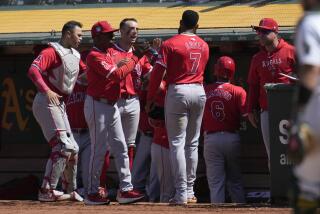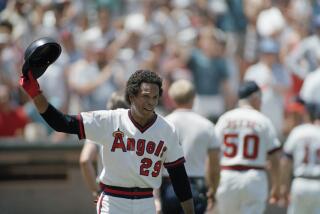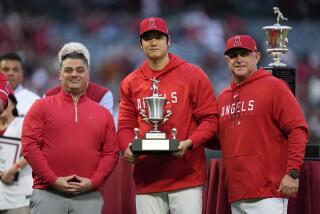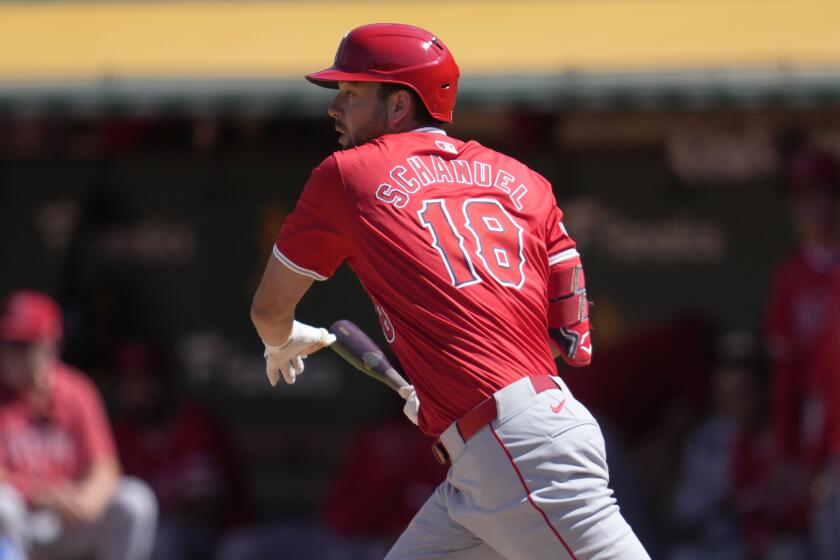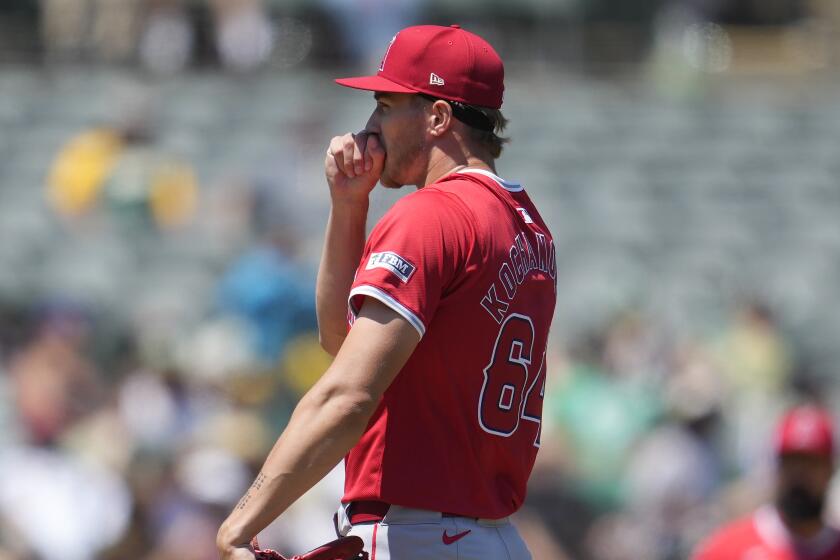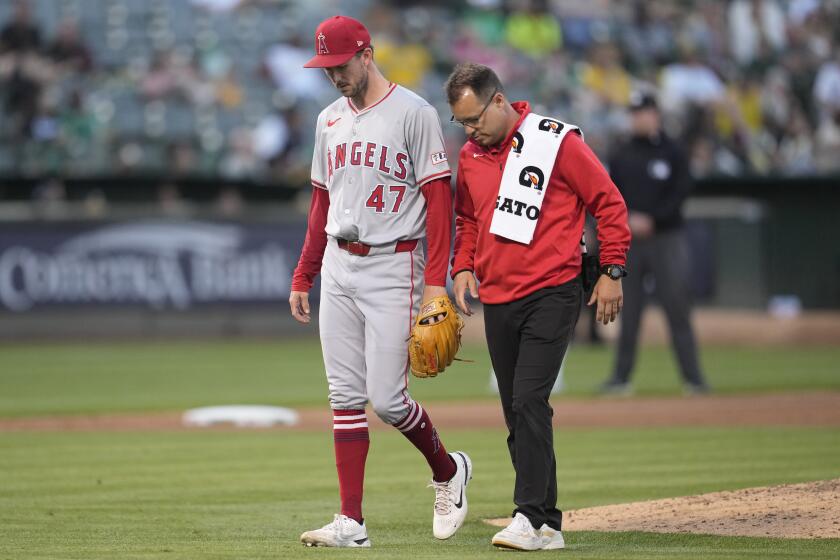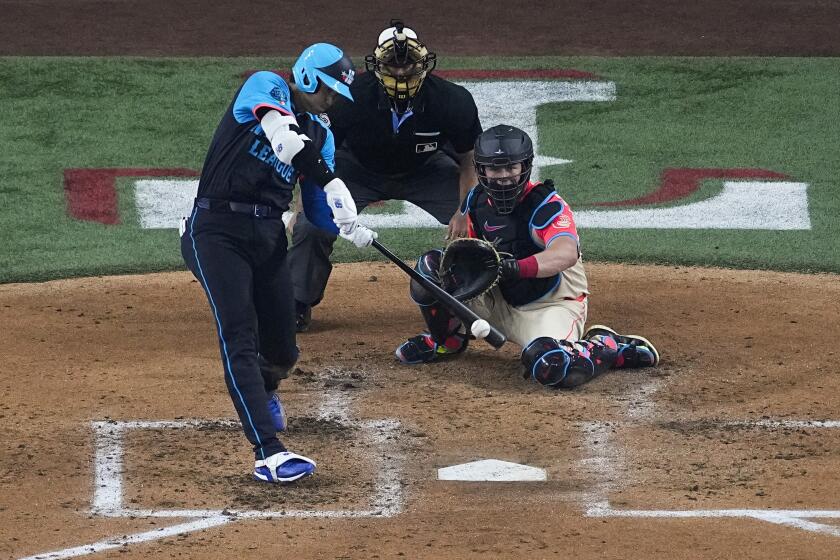City of Angels?
The most intriguing issue involving the Angels and Dodgers as they open the new baseball season doesn’t pertain to the question of whose town it is now.
Just because the Dodgers haven’t been to the World Series in 15 years and the Angels are now the big kid on the block after winning their first World Series and turning history on its ear doesn’t mean the Friars Club and other blue bastions are about to forsake their favorite team.
Just because the pounding of those plastic sticks in harmony to the Angels’ relentless offense undoubtedly created shock waves across the Southland -- and, perhaps, registered on the Richter scale of Dodger souls -- doesn’t mean those deep and long-planted Dodger tentacles are going to be uprooted.
All it means is that the Dodgers and Angels are about to prove what they have always suspected, which is that this sprawling “town” without boundaries, from Santa Clarita to San Clemente, from Manhattan Beach to Moreno Valley, is big enough for both. All it means is that the Dodgers are likely to produce 3 million in attendance for the eighth consecutive season while the Angels are likely to do it for the first time in their 43-year history, proving what they too have always suspected and Disney may not have initially believed -- winning is the best marketing gimmick of all.
No, as the Angels move out from under the Dodgers’ shadow, with “a chance now to sustain the recognition and respect we’re receiving,” as Tim Mead, the club’s vice president of communications, put it, the real issue is to what extent has this role reversal left the Dodgers feeling as if they have more than a rally monkey on their back?
No, the real issue is how ticked are the Dodgers as the Angels get played on the cover of Sports Illustrated and the Sporting News and ESPN the Magazine, and all of the Angels’ spring games are on radio compared to only 14 for the Dodgers, and Los Angeles-based camera crews hop over to the champions’ camp in Arizona but pass on Vero Beach.
No, the real issue pertains to what level the Dodgers’ consternation has reached as they reflect on the Angels’ selfless sweep through October when they became the industry model for the way to play the game, as if Branch Rickey and Al Campanis never wrote the text on “The Dodger Way to Play Baseball,” and to what extent that consternation was compounded by the fact that it took a Dodger hallmark named Mike Scioscia -- forced out of Dodge and the Dodger organization by “Sheriff” Kevin Malone -- all of about three minutes to lead the Angels to the promised land as their manager, head of a coaching staff that almost to a man also had roots in the Dodger system.
The answers to those questions are difficult to come by because there’s a lot of history and baggage involved. The Angels don’t want it to appear they are gloating, and the Dodgers -- who weren’t exactly out of sight and mind as they won 92 games and pursued a wild card into late September -- don’t want it to appear they are pouting. So a search for truth is frustrated more often than not until it reaches the spring locker of Dodger catcher Paul Lo Duca, who contemplated the Angels’ ascent and said:
“Frankly, I’m bugged by it, and I would think a lot of the guys here feel the same way. Watching our two rivals [the Angels and San Francisco Giants] play in the World Series was the worst nightmare for Dodger players, and I think a lot of us switched off our TVs.
“I mean, the Angels may not be the heated rivals that the Giants have been, but they’re only 30 minutes down the freeway and there’s a lot of neighborhood pride involved, kind of a turf war to it, and no one wants to think that those fans who might have been on the fence are now Angel fans. We have to accept the fact that they’re the World Series champions, but it’s a new year and we have to turn it up a notch, use the Angels as an example, as motivation.
“We’ve put our fans on a roller coaster the last couple years and we need to make a run at it. It’s been 15 years since we’ve been in a World Series. We owe the fans.”
In 30 of 42 seasons, the Dodgers have finished higher in the standings than the Angels. From 1959 to 1988, the Dodgers made nine World Series appearances and won five titles. If Lo Duca is the first Dodger ever to say the Angels should be an example and a motivation, if he is the first to acknowledge that the Series matchup represented the Dodgers’ worst nightmare, it’s nothing more than what Dodger executives undoubtedly believe but judiciously refrain from saying.
“You won’t hear any vindictiveness, jealousy or embarrassment from us,” said Derrick Hall, the senior vice president of communications. “This wasn’t a panic period for the Dodgers but a long-overdue reward for the Angels. They’re doing things right, and we feel we’re getting back to that emphasis on stability and the farm system.
“Would we have rather it been us in the World Series? Absolutely. But we’re happy for the Angels, a lot of our former people are there, and as [Chairman] Bob Daly said at the time of the World Series, ‘Would the Giants ever root for us?’
“I mean, there’s no denying that the Angels are a hot topic and wonderful story. They’ve helped rejuvenate baseball interest nationally and in Southern California, and in that way they’ve been good for the Dodgers.”
At best, however, the relationship always has been tenuous.
The Angels were created only after Dodger owner Walter O’Malley took his club’s broadcasts off Gene Autry’s Los Angeles radio station because he couldn’t pick up transmissions at his Lake Arrowhead retreat, sending Autry to an American League meeting in St. Louis where he hoped to acquire broadcast rights to the AL’s 1961 expansion team in L.A. and instead ended up with the team.
Who can remember that in the ‘60s, when the Angels were playing at Dodger Stadium, O’Malley billed them for every roll of toilet paper and new plant and the cleaning of windows in offices that didn’t have windows?
Who can remember that Buzzie Bavasi, general manager of the Angels in the late ‘70s and early ‘80s after his long career with the Dodgers, frequently acknowledged that the Angels were in marquee competition with the Dodgers, principally because of Vin Scully’s popularity, and that competition led to mistakes in payroll and personnel?
Who recalls the resentment that Don Baylor frequently expressed even after leaving the Angels about the secondary play the team had always received in the Southern California media market or that it was only two years ago that the Dodgers, too late for the Angels to make a significant scheduling adjustment, called off the annual Freeway Series on the last weekend of spring to schedule a bigger payday with the New York Yankees?
The Freeway Series was reinstated this spring and maybe that’s a sign of an improved relationship between the clubs, or maybe only that the humbled Dodgers are now forced to put the Angels in the Yankee class.
Richard Brown, the Angel president from 1990 to 1996, reflected and said, “To some extent, because of the disparity in season-ticket sales and coverage in the local media, we sometimes felt like an opening act for the Dodgers, but we were never envious or never felt inferior.
“Nor, in the time I was with the club, did we think we were in competition on the field or were motivated to make moves based on what the Dodgers were doing. We competed for airtime and advertising time, and we knew that the only way to get to the Dodgers’ level, the only way to establish a tradition comparable to that of the Dodgers, a tradition we respected, was by winning.”
Mead, the communications vice president, agreed.
“I suppose you could go back 20 or 25 years and Buzzie may have felt differently, but I don’t think anyone in our organization ever construed it as competition [with the Dodgers],” Mead said. “If you sat in our meetings, whether they were marketing or PR meetings, to change the course we knew we had to win.
“It wasn’t like we thought of ourselves as an afterthought, but if people had a choice of where they were going to spend their money, it was most often at Dodger Stadium, and if there was a choice of which story got the best treatment, it was the Dodger story. [Baylor] carried that resentment for years, and if the players sensed it and saw it, we sensed it and saw it as an organization, but it was still up to us to change it.”
The Angels would seem to have taken a major step. Season-ticket sales have jumped from 13,000 to more than 20,000, a club record. Edison Field again will be a sea of red.
“I’ve always been a firm believer that if you think you deserve respect, you’ve got to go out and earn it,” closer Troy Percival said. “I grew up locally and knew the Dodger history and knew they deserved to have the reputation and media following that they had. You never like to be the team that’s overlooked, but there was a reason. It’s like the Yankees. You can’t deny that history. Now that we’ve gone out and started our own history, we deserve to get a little more respect and recognition in our own area, there needs to be a change in that regard, but it’s one step and we need to take others.”
Scioscia, of course, has viewed the street from both sides.
“Playing with the Dodgers,” he said, sitting in his spring office, “we always had a lot of respect for the Angels because of the caliber of players who came through here, Hall of Fame players.
“I mean, the perception of the Angels being a stepchild to the Dodgers was never really anything we felt or anything we even thought. Nor would I think that our success of last year does anything to diminish Dodger tradition or what they have accomplished as an organization, and that works both ways in the sense that what we need to do isn’t affected by any success the Dodgers have.”
For Scioscia, who once seemed on the fast track to becoming the Dodger manager before Malone and his staff made his life unbearable while the former Dodger catcher was managing at triple-A Albuquerque, there has to be a satisfaction in helping the area’s other team become something more than a perceived stepchild, and doing it with an approach on offense that put the emphasis on team and was widely applauded.
“My satisfaction isn’t enhanced by any perception of what went into my resignation from the Dodgers,” Scioscia said. “My satisfaction is in how this club achieved, getting the opportunity here to reach the goal of managing and the goal of winning.
“I think there’s an electricity that comes with our grass-roots style of play, and I think there’s a sense of confidence now that winning a World Series can bring. But what I really like about our club is that the confidence is tempered with a pragmatic outlook of knowing we have another challenge. These guys are great at maintaining a focus that’s needed to achieve, and I think that filters out a lot of distractions.”
Long in the bright blue shadow of the Dodgers, the Angels were the ones this year who had to filter out the spring media distractions that came with their first World Series title.
If there was a role reversal after 42 years, some Angels think the comparison with the Dodgers is secondary to the comparison to their own history.
“For the first time, we go into a season focused on the here and now, not the past,” Mead said. “We don’t have to answer questions any more about injuries and September collapses and never having won a postseason series. I think there’s a respect and credibility level now, and what makes it especially good is that I don’t think we’re simply the flavor of the month.”
The taste might not appeal to Lo Duca and other Dodgers, but the “town” should be big enough for both.
More to Read
Go beyond the scoreboard
Get the latest on L.A.'s teams in the daily Sports Report newsletter.
You may occasionally receive promotional content from the Los Angeles Times.
